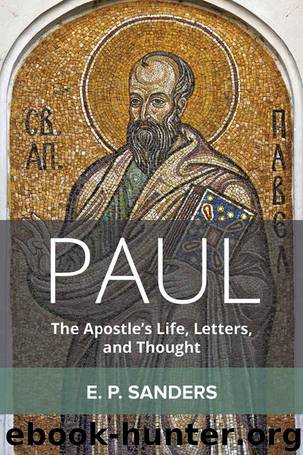Paul: The Apostle's Life, Letters, and Thought by E. P. Sanders

Author:E. P. Sanders [Sanders, E. P.]
Language: afr
Format: epub
ISBN: 9781506404974
Publisher: Fortress Press
Published: 2015-12-01T07:00:00+00:00
This requires virtually no comment. The creation, which in Rom. 8:19-23 is groaning as it awaits redemption, has here already been renewed. The old has passed away.
In these four verses, Paul moves into the present what is otherwise future. As is often the case with realized eschatology, the presence of end-time events, or the beginning of transformation to a body like Christ’s, cannot be demonstrated empirically. No one could see that Paul and the other Christians were being transformed into the image of Christ, changed from one degree of glory to the other (2 Cor. 3:18). Probably their faces kept getting older and more wrinkled. The transformation was of the inner person, not the outer (4:16).
Then what does it mean to say that they were being transformed into the image of the Lord (3:18)? The word image implies that the transformation is visible. Paul does not work this out. Logically, he should have spoken only of the present transformation of the inner person. Spiritual enthusiasm, however, which Paul and the Corinthians shared, leads people to perceive in themselves that they are new people, full of power and perceptions that they had not previously had. It also sometimes leads to hyperbole.
Paul always thought that Christians have something in the present that marks their conversion. Most frequently he speaks of the Spirit as the present gift of God, as in 1 Thess. 4:8. And, of course, during his founding visit in Corinth he had told his converts that they would have gifts of the Spirit, such as speaking in tongues (above, pp. 264; 276-78). It is, nevertheless, striking that in this section of 2 Corinthians he emphasizes the present transformation of Christians so strongly, using the very words that he elsewhere puts in the future. We cannot be sure why he did this, though I shall offer two suggestions.
1. The first is that the Corinthians wanted more emphasis on present spiritual riches. To see this, we go back to 1 Cor. 4:8, where he wrote satirically about the Corinthians for thinking that they already had it all:
Already you have all you want! Already you have become rich! Quite apart from us you have become kings! Indeed, I wish that you had become kings, so that we might be kings with you!
Download
This site does not store any files on its server. We only index and link to content provided by other sites. Please contact the content providers to delete copyright contents if any and email us, we'll remove relevant links or contents immediately.
The Five People You Meet in Heaven by Mitch Albom(3550)
The Secret Power of Speaking God's Word by Joyce Meyer(3165)
Real Sex by Lauren F. Winner(3006)
Name Book, The: Over 10,000 Names--Their Meanings, Origins, and Spiritual Significance by Astoria Dorothy(2973)
The Holy Spirit by Billy Graham(2941)
0041152001443424520 .pdf by Unknown(2842)
How The Mind Works by Steven Pinker(2811)
ESV Study Bible by Crossway(2772)
Ancient Worlds by Michael Scott(2678)
Churchill by Paul Johnson(2576)
The Meaning of the Library by unknow(2563)
The ESV Study Bible by Crossway Bibles(2546)
The Gnostic Gospels by Pagels Elaine(2519)
MOSES THE EGYPTIAN by Jan Assmann(2411)
Jesus by Paul Johnson(2351)
City of Stairs by Robert Jackson Bennett(2339)
The Complete Dead Sea Scrolls in English (7th Edition) (Penguin Classics) by Geza Vermes(2269)
The Nativity by Geza Vermes(2226)
Ancient Near Eastern Thought and the Old Testament by John H. Walton(2220)
